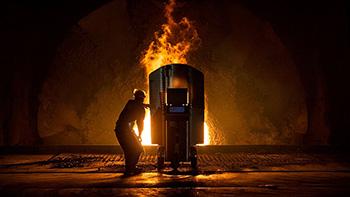(单词翻译:单击)

Worries about the effect of trade and globalisation on workers are a staple of politics in the US and Europe.
担心贸易和全球化对劳动者的影响成了欧美政治的家常便饭。
So it is perhaps unsurprising that the EU, with an eye on China and particularly on steel, is planning to make it easier to block subsidised or dumped imports with emergency tariffs.
因此或许毫不意外的是,关注中国、尤其是中国钢铁的欧盟(EU),正计划让通过征收紧急关税阻止受补贴或倾销的进口产品入境变得更容易一些。
That it is unsurprising does not mean it is wise.
不意外并不意味着这是明智之举。
There is no doubt Chinese production, thanks to state-subsidised overcapacity, is pushing down the global price of steel.
确实,拜政府补贴的过剩产能所赐,中国生产出来的钢铁正在压低全球钢铁价格。
Yet the advanced countries should accept that putting up barriers simply disadvantages other industries and interrupts the vital global supply chains on which modern trading economies depend.
然而,发达国家应意识到,设置壁垒会对其他行业不利,并干扰现代贸易经济所依赖的至关重要的全球供应链。
The EU’s probable change of policy is designed to sidestep a looming problem of whether China should be accorded market economy status, which would make it harder to impose antidumping or countervailing (anti-subsidy) duties on Chinese imports.
欧盟可能采取的政策变化旨在绕过中国是否应被赋予市场经济地位这一日益逼近的问题,如果中国取得这一地位,其他国家将更难对进口自中国的商品征收反倾销税或反补贴税。
When assessing such duties on a non-market economy, the EU is permitted to use costs from a supposedly analogous third country to calculate how big the penalties can be.
在评估针对非市场经济体征收的这类关税时,欧盟可以利用被认为类似的第三国成本来计算惩罚的力度。
China argues — and many, though not all, trade lawyers agree — that it automatically acquires market economy status next month as part of the agreement when it joined the World Trade Organisation 15 years ago.
中国主张并得到很多(尽管不是全部)贸易律师认同的是,作为15年前中国加入世贸组织(WTO)的协议的一部分,中国将在下月自动获得市场经济地位。
Rather than decline to grant that designation and invite a WTO dispute, the EU Commission proposes abolishing the distinction between market and non-market economies and instead allowing the EU leeway to pick data to support its case.
欧盟委员会(European Commission)并未拒绝赋予中国市场经济地位进而引发WTO争端,而是提议废除市场经济与非市场经济的区别,让欧盟自由选择数据支撑其征税理由。
The result could well be the imposition of US-style antidumping tariffs reaching well above 100 per cent, and a consequent noticeable rise in the internal EU price of commodities such as steel.
结果很有可能是征收美国那种远远高于100%的反倾销关税,继而导致欧盟内部钢铁等大宗商品价格显著上涨。
This is not a positive development.
这并非一种有利的变化。
If EU countries want to build infrastructure or develop world-beating manufacturing companies, they will benefit from a cheaper domestic price of steel.
如果欧盟国家希望建设基础设施或发展世界级制造企业,它们将从较为廉价的国内钢铁价格中受益。
The more that global value chains snake around the world, finding the most efficient place to produce, the more that putting tariffs in the way disadvantages the economy that imposes the restrictions.
全球价值链在世界蔓延得越长(从而找到最高效的生产地),征收关税加以阻碍越会对实施这种限制的经济体不利。
Economic change is wrenching, particularly for industries with regional concentration, but the future for developed economies lies with users, not producers, despite closures being savage blows to steel towns.
经济变革是痛苦的,尤其是对于区域集中型的行业而言,但发达经济体的未来在于消费者,而非生产者,尽管工厂关闭将对钢铁城镇造成严重打击。
Whether or not this situation contributed significantly to president-elect Donald Trump’s election victory, the hollowing-out of basic manufacturing has created intense resentment among affected communities.
不管这种形势是否对美国当选总统唐纳德.特朗普(Donald Trump)的选举胜利做出了巨大贡献,基础制造业空心化都导致受影响社群产生了强烈的愤恨情绪。
But making it harder for new industries to emerge by increasing the price of basic commodities only delays the transition.
但通过提升基础大宗商品的价格加大新行业出现的难度,只会推迟转型。
The forces of protection within the EU have been growing in strength, and it was the recent conversion of Germany to the cause that will probably tip the balance.
欧盟内部保护主义力量的强度一直在加大,特别是德国最近也转向保护主义,这很可能会颠覆局面。
The UK has generally led the fight to restrain antidumping duties, despite domestic criticism over the threatened Port Talbot steel plant in Wales.
尽管英国国内对威尔士塔尔伯特港的钢铁厂面临威胁感到不满,但英国基本上一直走在抵制反倾销税的前沿。
With Britain leaving the EU, however, resistance is crumbling.
然而,随着英国脱离欧盟,抵抗力正在减弱。
The new EU policy on antidumping and anti-subsidy duties is a bleak foreshadowing of a Europe in which the defenders of free trade are either switching sides, like Germany, or leaving the field, like the UK.
新的欧盟反倾销和反补贴关税政策是欧洲悲观前景的预兆,自由贸易的维护者要么会像德国那样改变立场,要么会像英国那样离开欧盟。
It may bring some short-term political relief to governments whose voters are complaining about globalisation.
对于那些选民正抱怨全球化的政府而言,保护主义可能会带来一些短期的政治压力缓和。
In the longer term, though, it will do nothing to build the kind of modern, profitable sectors that will lead European economic growth.
然而,较长期而言,这无助于打造将引领欧洲经济增长的现代盈利产业。


